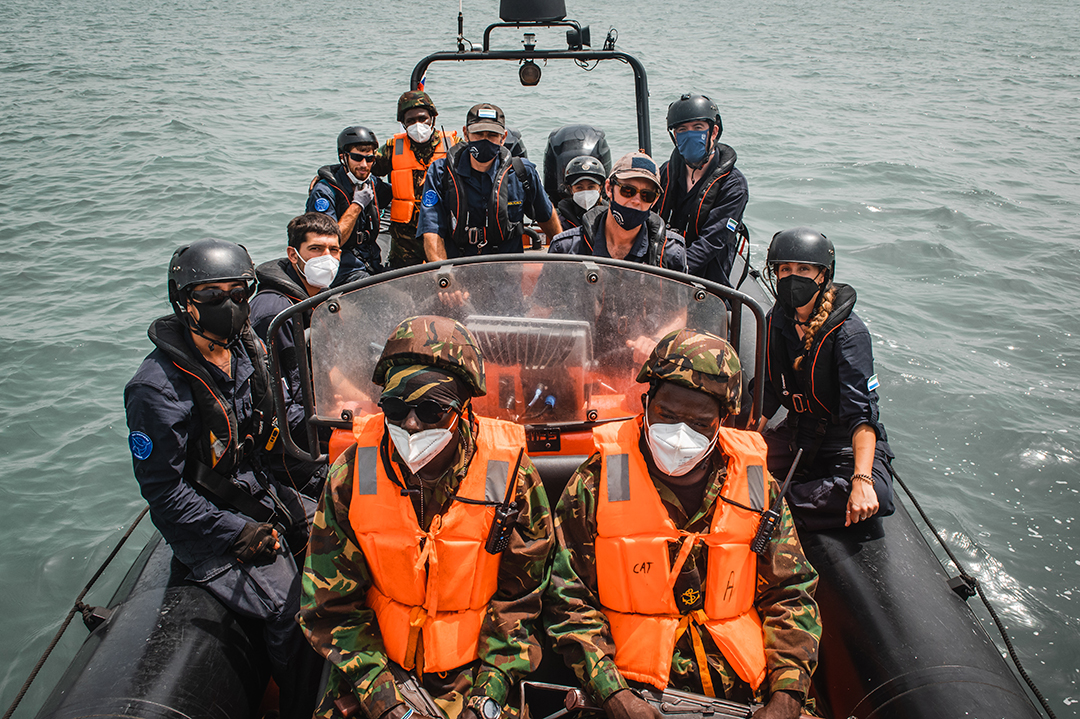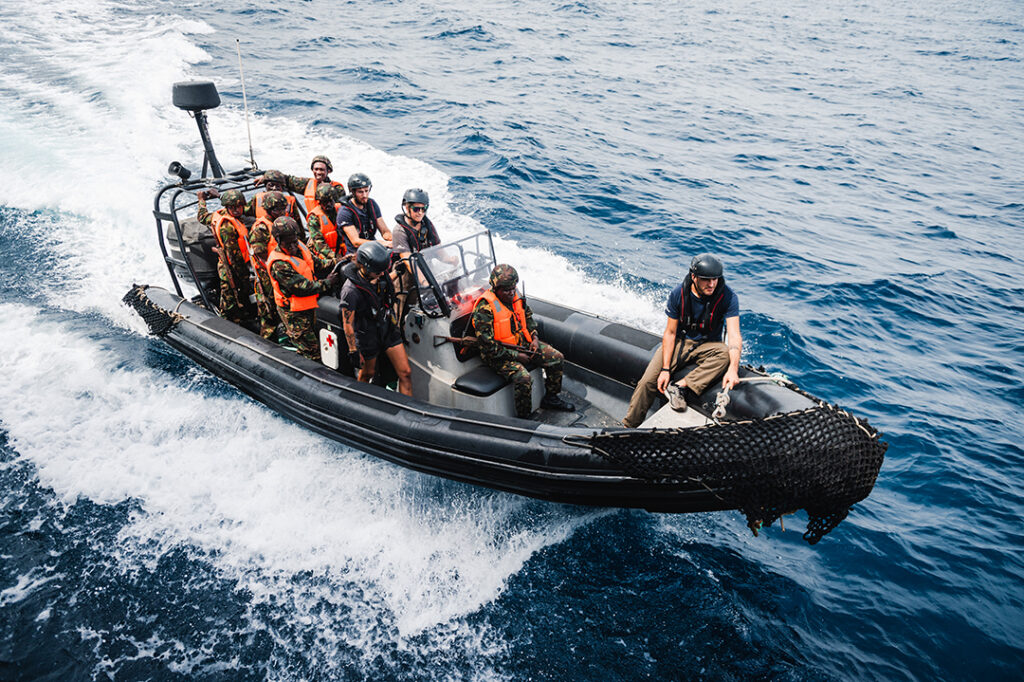ADF STAFF
The captains of industrial fishing vessels Friendship 806 and Friendship 888 had no idea they were being watched.
The trawlers were anchored overnight just outside Sierra Leone’s inshore exclusion zone (IEZ) reserved for artisanal fishermen. At first light, they made their way into the prohibited area dragging their nets in the water.
Sailing through waters full of small-scale artisanal pirogues, they soon were intercepted by two of Sea Shepherd Global’s rigid-hull inflatable boats, which carried gun-toting Sailors from the Sierra Leonean Navy.
“We’d been watching them on radar all night,” Peter Hammarstedt, Sea Shepherd’s director of campaigns, told ADF in an email.
The crews of both trawlers were arrested March 14 and charged with fishing without a license and transmitting false electronic identifying information. Both vessels were flagged to Sierra Leone, but one of them was using the identity of another vessel fishing more than 7,000 miles away in the Pacific Ocean.
Such tactics are common among trawlers involved in illegal, unreported and unregulated (IUU) fishing in West Africa.

The next morning, Sea Shepherd helped the Sierra Leonean Navy arrest another industrial trawler, Jianmei 3, as it was anchored off the port of Kent. Sea Shepherd’s radar had documented it fishing 6 miles inside the IEZ for several nights, just outside a protected area designated to conserve spawning fish.
When Sierra Leonean Sailors boarded the vessel, its crew was dismantling fishing gear and taking apart winches and trawling equipment to make it appear as though the vessel had not been fishing. A confiscated logbook showed that the trawler had fished in the IEZ 44 times, Sea Shepherd reported.
The Jianmei 3 was flagged to Sierra Leone but with beneficial ownership in South Korea, Hammarstedt said. Beneficial ownership is when a foreign company or country buys the rights to fish in another country’s waters. These vessels typically fly the flag of the host country to disguise their true ownership and skirt the scrutiny of local authorities. Under these arrangements, the vessel’s owners benefit from the catch, not the country it is flagged to.
Local authorities were well acquainted with the trawler’s sister ships, Jianmei 1 and Jianmei 4, which were arrested last year for illegal fishing. Those ships simply sailed away before paying their fines and still are wanted by Sierra Leonean authorities.
Hours after the apprehension of Jianmei 3, two Chinese-flagged trawlers — Liao Dan Yu 6616 and Liao Dan Yu 6618 — were arrested for fishing without a license. Liao Dan Yu 6618 was carrying two separate sets of registration documents, and the captain was trying to shred proof that his fishing license was expired as Sailors stormed the wheelhouse.
As those ships were detained, 11 other trawlers in the same fleet fled to avoid inspections, Hammarstedt said on Sea Shepherd’s website. Vessels from other fleets also left the area when they learned a patrol was underway.
More than 200,000 people work in small-scale fisheries in Sierra Leone, where locals have protested the presence of industrial trawlers in their waters for years. Local fishermen say the industrial trawlers often harass them by running over their canoes and nets and further deplete dwindling fish stocks.
Illegal fishing costs Sierra Leone $29 million a year. About 75% of IUU incidents in the country are connected to China, according to estimates by China Dialogue Ocean.
“These fishing vessels are plundering our waters, stealing from local fishermen and the people of Sierra Leone,” Sierra Leonean Defense Minister Kellie Conteh said on Sea Shepherd’s website. “These five arrests send the strong message that if you are caught fishing without a license then you will be arrested by the Sierra Leone Navy and you will be prosecuted to the furthest extent of the law.”
Since 2016, Sea Shepherd also has partnered with the governments of Benin, Gabon, The Gambia, Liberia, Namibia, São Tomé and Príncipe, and Tanzania. Its partnership with Sierra Leone started last year. The partnerships have resulted in the arrest of 67 vessels for illegal fishing and other fisheries crimes in West Africa.
Economists say IUU fishing cost West African countries more than 300,000 artisanal fishing jobs and roughly $2.3 billion in revenue between 2010 and 2016, according to Liberia’s Daily Observer newspaper.
Sierra Leone’s government also is battling tax evasion in its efforts to eliminate illegal fishing. The government says it will close businesses, take court action or withhold port clearance certificates from companies that don’t pay taxes.
The country also has invested in six boats to patrol coastal inshore waters, and in radio equipment, electronic tablets and Android phones to strengthen maritime law enforcement and surveillance, President Julius Maada Bio said in a Sierra Leone Telegraph report.

